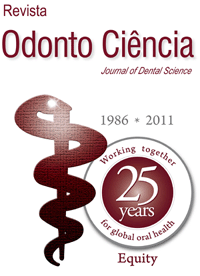PURPOSE: To evaluate the influence of the mother's periodontal clinical status on the prevalence of periodontal pathogens in newborns. METHODS: Seventy-six pairs of newborns and their biological mothers were selected. After a periodontal examination, the mother-child pairs were divided into two groups according to their maternal periodontal clinical status: mothers with (Group A, n=33) or without periodontitis (Group B, n=43). The oral colonization of newborns by five periodontopathogens (A. actinomycetemcomitans, P. intermedia, P. gingivalis, T. forsythia and C. rectus) was determined using a DNA-specific PCR method. Statistical analysis was performed using the Chi-square test at the significant level of 0.05. RESULTS: C. rectus was the most prevalent species observed (23.25%) in Group B, while in Group A P. gingivalis (96.97%) had the highest detection rate, followed by T. forsythia (60.60%) and P. intermedia (39.39%). Between-groups comparisons showed a greater frequency of all study pathogens among newborns from Group A. CONCLUSION: The maternal clinical periodontal status was a satisfactory indicator of the bacterial colonization pattern observed in their newborn children. Thus, longitudinal studies should be performed to confirm this relationship.
Infant; periodontitis; bacteria; polymerase chain reaction





